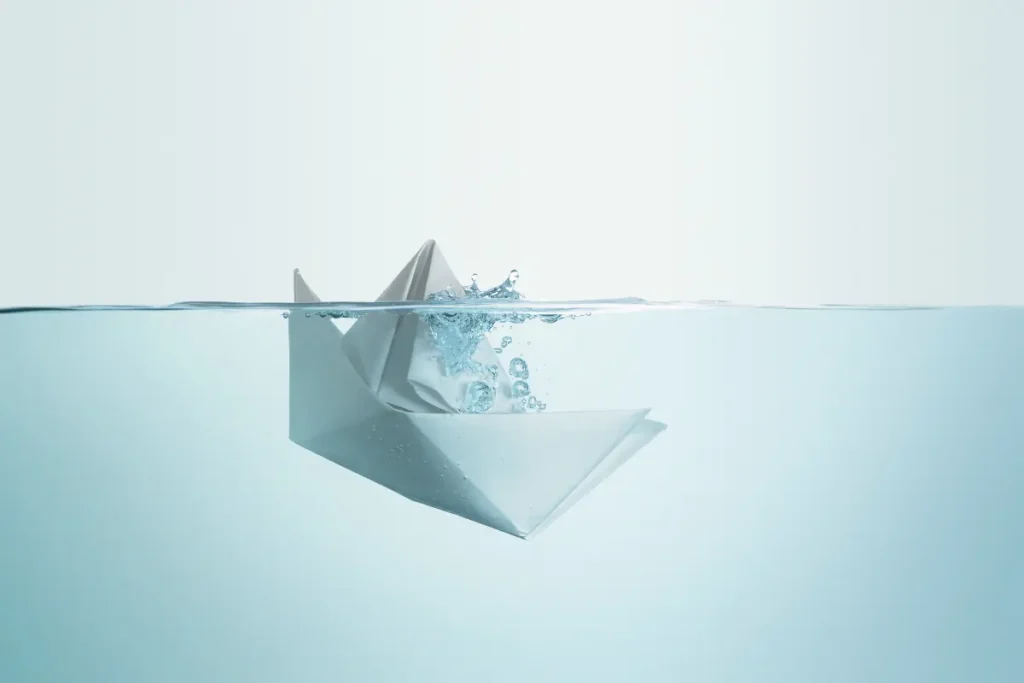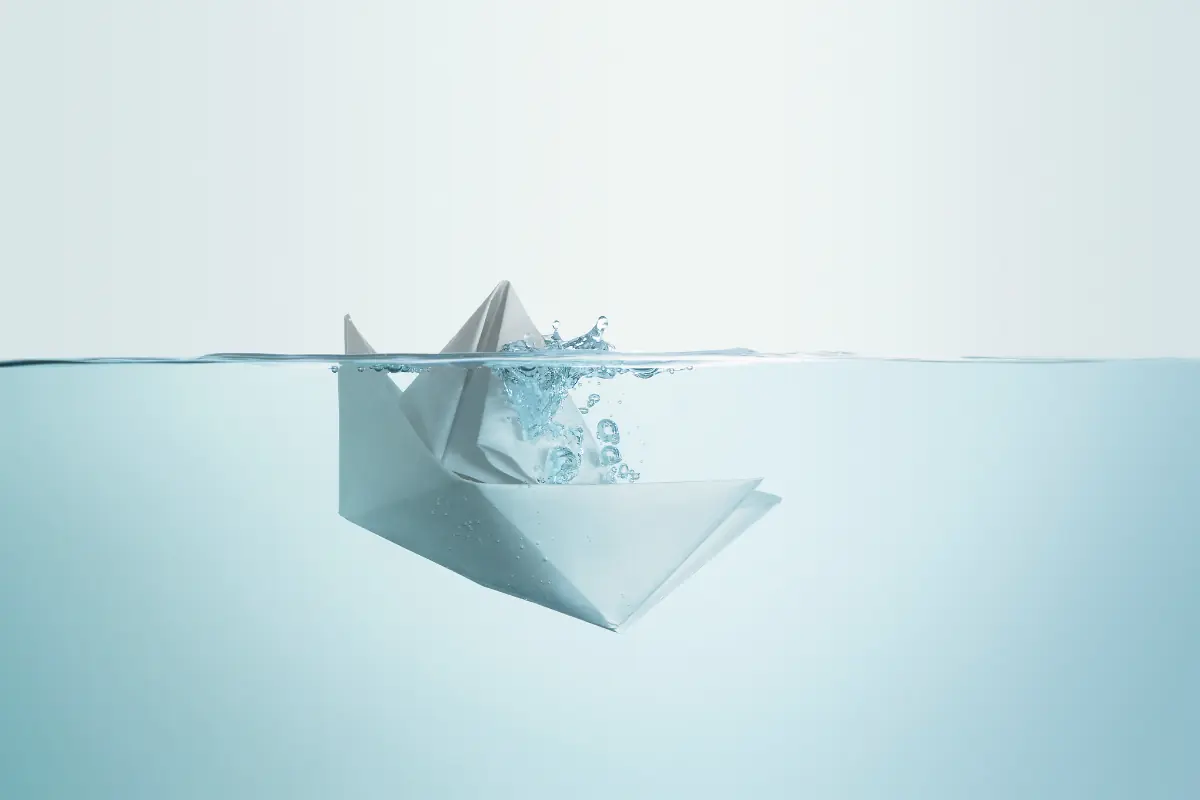Many consider pontoon boats to be unsinkable. But, let’s be real. No watercraft is actually unsinkable. For anyone who is planning to buy their first pontoon, the fear of capsizing is natural.
So, to put your fears to an end, let’s talk about whether or not can a pontoon boat sink.
Pontoon boats are extremely difficult to capsize since their weight and length are designed in such a way that they do not invert even when the weight distribution is imbalanced. These boats, however, were not built to withstand strong winds or storms. So for deep-sea adventures, these boats won’t be suitable as it has no cover that prevents capsizing.
I’ve already discussed whether pontoon boats can capsize, and now I’d like to share some additional information on the subject.
For a better understanding of pontoon boat safety, it would be wise to read through the whole article.

What Makes Pontoon Boats More Stable than Regular Boats?
The pontoon boat’s unique design and wide surface area make it far more buoyant than regular boats. This makes it much more stable and resistant to capsizing.
Safety is a primary feature of pontoon boats. Now several factors make the pontoon boat a much safer option. Below, I will explain why this cruise has such a good reputation when it comes to security.
Its Design
Most people who traveled or worked on boats prior to the 1950s looked for a cruise that was safer to sail.
Pontoon boats were first developed in 1951, and their distinctive design provides a level of safety that other boats cannot match.
Even today, many people ask me, “Is it hard to sink a pontoon boat?” Well, these cruises have two hulls which ensure safer and easier sailing than most single-hulled boats.
This unique feature also makes the Pontoon boats more stable. Even if you are sailing this cruise at its max speed, the chance of tripping over is absolutely minimal.
Many sailors claim that it can even U-turn at high speed, something that no other boat can do.
Of course, I will highly discourage you to try this on your own. But it shows how dependable Pontoon boats can be.
It’s Surface
The surface of the Pontoon boats is flat, meaning they will not capsize easily. The gravitational force spreads evenly on every part of the surface when it is flat, meaning it’ll be able to take an uneven load without the risk of tripping.
With the flat surface, the Pontoon boats are also big in size. As you might already know, big cruises are less likely to capsize and can take much more load.
Most people choose this awesome boat for a family picnic, light traveling, and fishing.
When Can Pontoon Boat Capsize?
Heavy storms, chaotic waves, and high speeds can cause your pontoon to capsize if you are not careful.
So far I have discussed how a pontoon boat is a much safer option when it comes to cruises, but that doesn’t mean you can go on deep-sea fishing with such boats.
Like everything else, Pontoon boats also have a few shortcomings. Below, I will talk about when Pontoon boats capsize.
In a Stormy Weather
Pontoon boats are ideal for traveling with a large group of people, but they weren’t built to withstand storms. Most of these cruises don’t come with any cover attached, meaning they will capsize when winds are high.
Keep in mind, these cruises are designed for having a small picnic party or light river fishing. So, if you are foolish enough to take it out to sea on a stormy night, it is not the manufacturer’s fault.
But that doesn’t mean it is very fragile and will easily tip.
Most of the experienced sailors stated the fact that it is more than capable of handling a light storm and you will at least have a chance to dock it on time before something bad happens.
Meaning, you won’t have to worry about sudden bad weather, but again, don’t take it out on a deep-sea adventure.
Restless Waves
It goes without saying that Pontoon boats cannot tolerate heavy waves as the v-shaped design goes through the water, and it won’t lift when the water rises.
Again, such waves can only be found on the sea, so if you exclusively sail on rivers, it shouldn’t be an issue.
Most of the smaller water sources don’t have high waves, and these cruises are more than capable of handling the flow of lakes, rivers, ponds, and so on.
Very High Speed
I have talked about how pontoon boats can be easily handled at very high speeds. But this fact is only true for the built-in engine that comes with the package.
As you may know, these cruises may be heavily customized, and this is something that many people do.
I will highly recommend not changing the engine of this boat. If you are looking for high speed, simply ignore it. A fast sailing Pontoon boat might capsize and result in a drastic accident.
How to Avoid Capsizing a Pontoon Boat?
I think it is pretty safe to say that any boat can be capsized no matter how awesome the design was.
Consider the Titanic, which was built to perfection but sank on the first day of service, and Pontoon boats are no exception.
But do not worry, you will only need to keep a few facts in mind to avoid such a phenomenon.
Avoid Very High Speed
Pontoon boats were built to travel at a leisurely pace, therefore modifying the engine to make it sail faster than a speedboat greatly increases the risk of capsizing.
Keep the speed at an optimal level and you should not face any issues. A higher pace will not only make the boat hard to control but will also create an intolerable amount of friction which might help to capsize the boat.
Do Not Overweight the Boat
It goes without saying that overweighting the Pontoon boat might result in capsizing. Most people make this mistake as the size of the cruise indicates it can carry a very large weight.
The manufacturer will provide a maximum capacity on the manual, always follow it.
You should be especially wary if the model of the Pontoon boat is old as most of the cruises will lose their weight capacity with time.
Maintaining the cruise will significantly lower the risk of such a phenomenon.
Check the Vessels
As you might already know, one of the most common reasons behind a boat capsizing is its leaky vessels. And it is especially true for Pontoon cruises.
For avoiding any future mishaps, regularly check the vessels, and if you find any leaks, immediately repair them. I would highly suggest inspecting for cracks at least once a month.
Check Weather Forecast
Checking the weather forecast before sailing with your Pontoon boat will be highly recommended.
Because these cruises are not constructed to endure bad weather, a quick forecast check could spare you from an unpleasant sailing experience.
Conclusion
As you can see, Pontoon boats rarely capsize, but they might tip over in harsh conditions. “Can a pontoon boat sink?” is a common question by new pontoon owners and I’ve tried to explain it as best I could.
If you are planning to get one for yourself there is absolutely nothing to worry about. If you use your pontoon on calm water, which it is designed for, there is no chance for it to capsize.
Hopefully, after reading the whole article, you will be able to avoid such an unpleasant occurrence. Until next time, bye.

